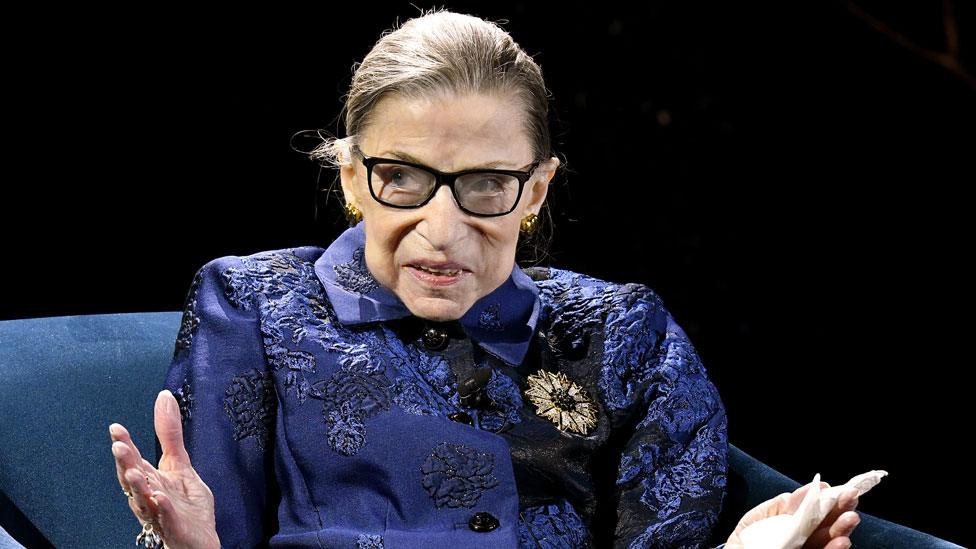Ginsburg Supreme Court: Trump plan an abuse of power, says Biden
- Published
Hundreds of people visited the US Supreme Court to pay their respects to the late justice Ruth Bader Ginsburg
Donald Trump's move to replace the late Supreme Court Justice Ruth Bader Ginsburg before the presidential election is an "abuse of power", his Democratic rival Joe Biden says.
Mr Trump has said he will nominate a woman to replace the longstanding liberal justice.
Mr Biden has urged Senate Republicans to delay a confirmation vote.
Ginsburg, a liberal icon and feminist standard-bearer, died on Friday, aged 87.
The appointment of judges to the Supreme Court is a political decision in which the president chooses who is put forward. The Senate then votes to confirm - or reject - that choice.
Democrats fear Republicans will vote to lock in a decades-long conservative majority on the country's highest court.
The ideological balance of the nine-member court is crucial to its rulings on the most important issues in US law.
What has Biden said about Trump's decision?
Mr Biden on Sunday said the president had "made clear this is about power, pure and simple".
"The United States constitution allows Americans the chance to be heard - and their voice should be heard... they should make it clear, they will not stand for this abuse of power," he said.
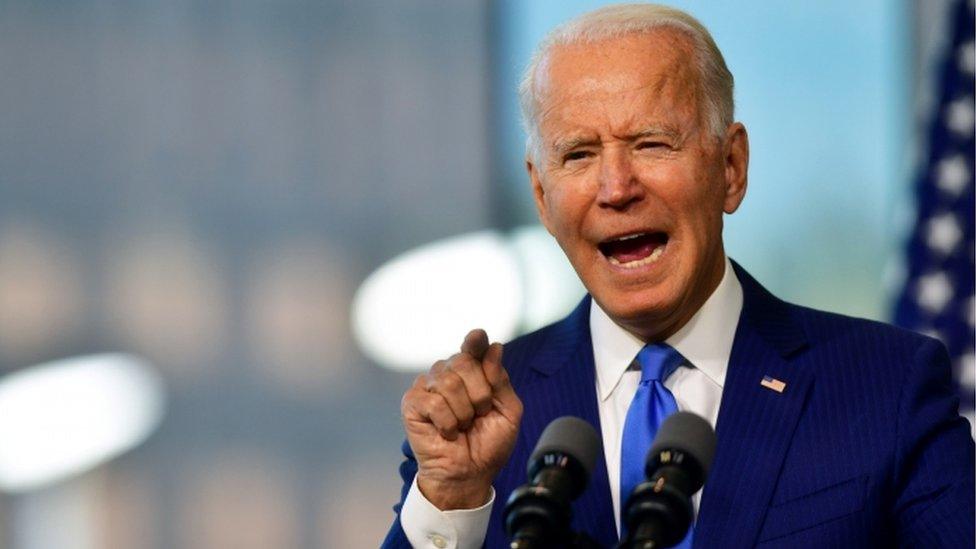
Joe Biden: "Our country faces a choice - about whether we come back from the brink"
"I appeal to those Senate Republicans - please follow your conscience, let the people speak, cool the flames that have been engulfing our country."
Mr Biden said that if he won the presidential election, Mr Trump's nominee should be withdrawn. He said he would then consult senators from both parties before putting forward his choice.
He has not named any potential nominees, but said his first choice "will make history as the first African American woman on the court".
How have senators reacted?
Two Republican senators, Susan Collins and Lisa Murkowski, have backed a delay in the vote.
Maine Senator Ms Collins said she had "no objection" to the process of reviewing a candidate beginning now, but that she did not believe the Senate should vote on the candidate prior to November's election.
Alaska Senator Ms Murkowski said she "did not support taking up a nomination eight months before the 2016 election" and believed the "same standard must apply" now.
Both women have broken away from party lines in the past, including on issues like abortion rights. Ms Collins faces a tough re-election bid this year and is trying to defend her reputation as a moderate.
If they are joined by two more Republican senators, they could block or at least delay a confirmation vote, as the Republicans have a majority of only six in the 100-seat Senate.
In the event that the vote is a tie, the US constitution allows Vice-President Mike Pence to cast a tie-breaking vote.
To avoid that outcome, Senate Majority Leader Mitch McConnell is seeking to secure the support of Republican senators. He has already won the backing of Republican Senator Lamar Alexander, who was viewed as a potential swing vote.
On Sunday, Mr Alexander said the US Constitution "gives senators the power" to vote on a Supreme Court nomination, even during a presidential election year.
Democrats have vigorously opposed any nomination before November's election, arguing that Senate Republicans blocked Democratic President Barack Obama's choice for the US top court in 2016.
What has Trump said about Ginsburg's successor?
Mr Trump has vowed to swear in Ginsburg's successor "without delay".
"I think it should be a woman because I actually like women much more than men," he said at a campaign rally in Fayetteville, North Carolina, on Saturday.
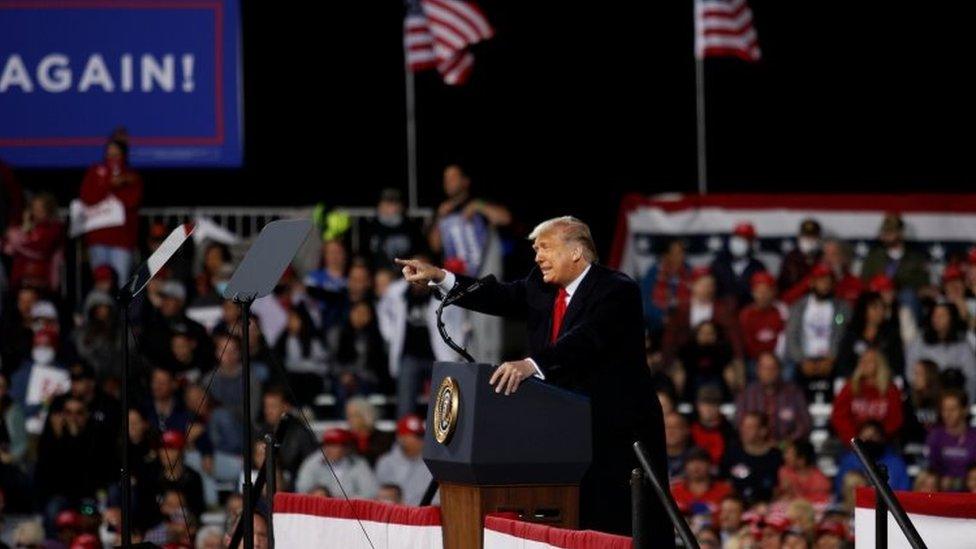
President Trump said Ginsburg's successor will be a "very talented, very brilliant woman"
Earlier, Mr Trump praised two female judges who serve on federal courts of appeals as possible choices. Both judges - Amy Coney Barrett and Barbara Lagoa - are conservatives who would tip the balance of the Supreme Court further in favour of the Republicans.
Mr McConnell said he intended to act on any nomination Mr Trump made and bring it to a vote in the Senate before election day.
How quickly can a Supreme Court justice be appointed?
Since 1975, it has taken about 70 days on average for the Senate to confirm a nominee.
After the president announces his nomination, the Senate Judiciary Committee vets the nominee and holds confirmation hearings. Nominees usually meet senators in person in Washington DC, and if the committee approves the nomination, it goes to the full Senate for a final confirmation vote, where a simple majority is needed.
Doing all of this before the 3 November election - less than 50 days away - would require uncharacteristic speed.
The last time the process was completed within this period was in 1993, with Ginsburg, when it took 42 days for her to be confirmed by the Senate, according to Congressional Research Service data.
In a statement to her granddaughter, days before her death, Ginsburg - one of only four liberals on the nine-seat bench - expressed her "fervent wish" not to be replaced until a new president had taken office.
How have Americans been paying tribute to Ginsburg?
Ginsburg, only the second-ever woman to sit on the Supreme Court, died of metastatic pancreatic cancer.
Displays of grief, appreciation and anxiety have been seen across the US, as the country reflects on her ground-breaking legal career and the future direction of the Supreme Court.
Supporters of the woman some affectionately called "The Notorious RBG" - a play on the name of the late rapper, The Notorious B.I.G - have been gathering outside the Supreme Court in Washington DC since Friday night. Visitors to the court have left flowers and signs in tribute.
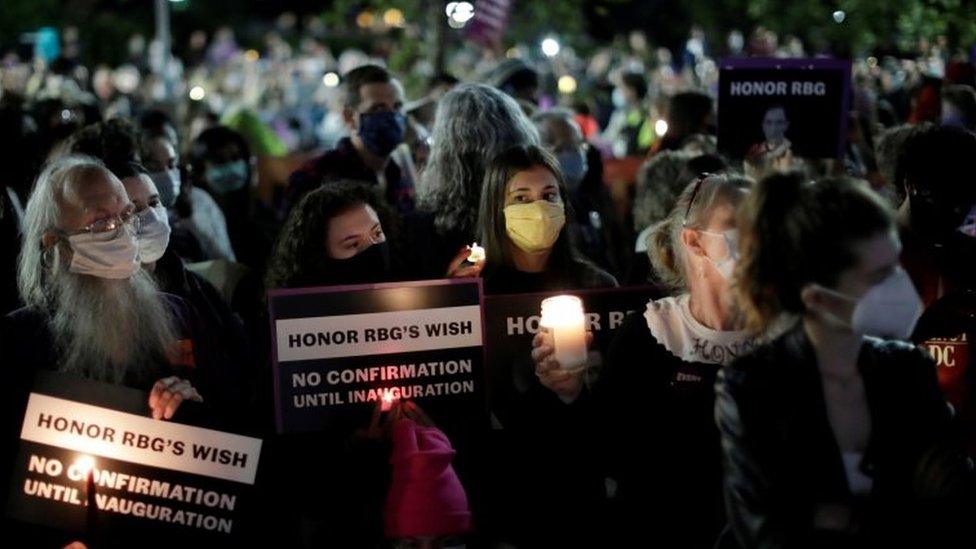
Mourners have been gathering outside the Supreme Court since Friday night
The Supreme Court said flags on its front plaza will be flown at half-mast for 30 days in honour of Ginsburg.
What does the Supreme Court do?
The highest court in the US is often the final word on highly contentious laws, disputes between states and the federal government, and final appeals to stay executions.
In recent years, the court has expanded gay marriage to all 50 states, allowed for President Trump's travel ban to be put in place, and delayed a US plan to cut carbon emissions while appeals went forward.
It also deals with issues like reproductive rights - one of the main reasons some anti-abortion conservatives want to tip the balance away from liberals.
Who are seen as top contenders?
Barbara Lagoa: A Cuban American of the Atlanta-based 11th Circuit Court of Appeals, she was the first Hispanic judge on the Florida Supreme Court. She is a former federal prosecutor
Amy Coney Barrett: Member of the Chicago-based 7th Circuit Court of Appeals, she is a favourite of religious conservatives and known for her anti-abortion views. She was a legal scholar at Notre Dame Law School in Indiana
Kate Comerford Todd: Deputy White House Counsel, has a lot of support inside the White House. Served as former senior VP and Chief Counsel, US Chamber Litigation Center
- Published19 September 2020
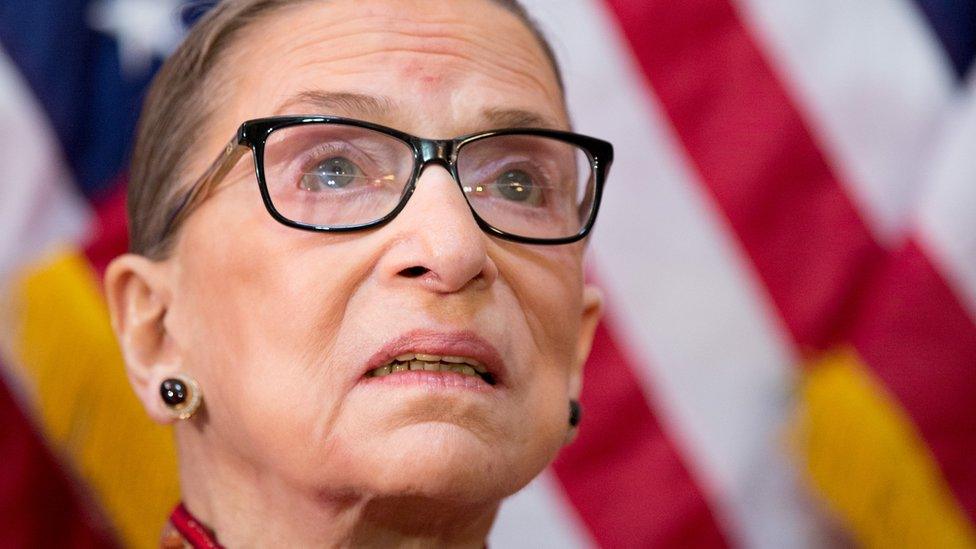
- Published19 September 2020
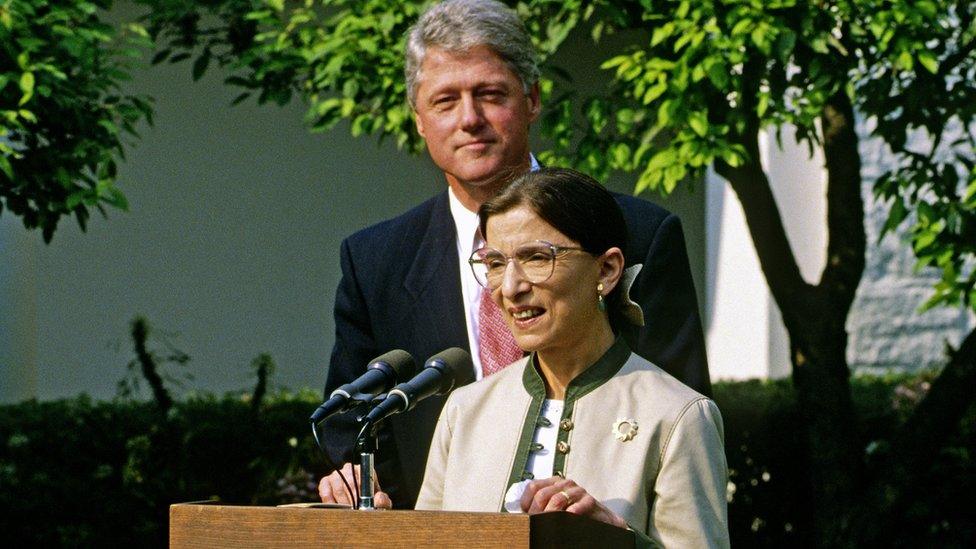
- Published17 July 2020
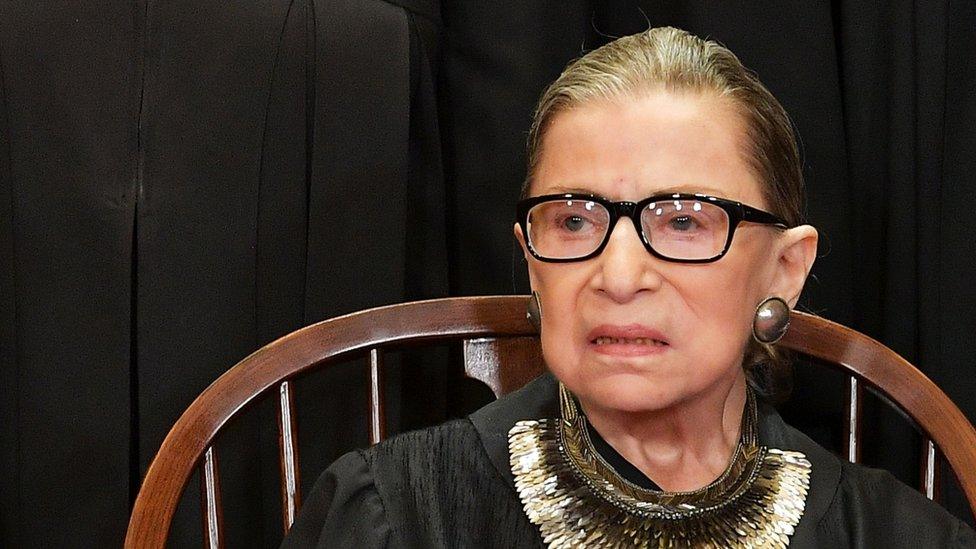
- Published17 December 2019
